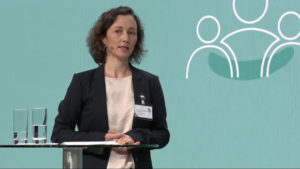 On 16 June 2021, as part of the 15th Federal Conference on Municipal Development Policy, organised by Engagement Global and the Service Agency Communities in One World (SKEW), Prof. Anna-Katharina Hornidge gave a keynote speech on „Development Research, Development Policy in the ‚New Normal‘ of the 21st Century“. For this, Mrs. Hornidge drew a parallel between climate change adaptation and dealing with the Covid-19 pandemic by addressing qualitative research on climate change adaptation in eastern Indonesia and dealing with the Covid-19 pandemic in the aquaculture sector in the Philippines.
On 16 June 2021, as part of the 15th Federal Conference on Municipal Development Policy, organised by Engagement Global and the Service Agency Communities in One World (SKEW), Prof. Anna-Katharina Hornidge gave a keynote speech on „Development Research, Development Policy in the ‚New Normal‘ of the 21st Century“. For this, Mrs. Hornidge drew a parallel between climate change adaptation and dealing with the Covid-19 pandemic by addressing qualitative research on climate change adaptation in eastern Indonesia and dealing with the Covid-19 pandemic in the aquaculture sector in the Philippines.
Climate change, when actors do not know that its impacts will be with us for the long term, often results in actors initially investing in short-term responses. By the time the realization sets in that the impacts of climate change will be repeated over and over again and become the ’new normal‘, the scarce resources for coping have often already been used up. As a result, the resources needed for long-term adaptation are scarce. Uncertainty about more likely and less likely future scenarios thus creates a breakdown of the basis for action: predictability. Hornidge notes that a similar situation was seen last year in the handling of Covid-19. It addresses data from the Philippines in the aquaculture sector, developed together with Aisa Manlosa and Achim Schlüter in the BMBF-funded Food4Future project. But a similar decay of the knowledge base, and thus erosion of capacity to act, has been observable in many contexts, she says. According to Hornidge, comparably accelerated effects of global megatrends are to be increasingly expected in the future. In order to preserve the ability to act at the political, private sector and civil society levels as far as possible, a solid, empirically-based understanding of possible future scenarios is essential. She speaks of ‚moving target research‘, which is gaining substantial importance, especially in the field of development research, in order to ensure political capacity to engage in sustainable development and the global common good as much as possible. According to Hornidge, municipal development policy and cooperation play a central role in shaping the interface between politics and civil society and – with reference to a study conducted at the DIE under the direction of Eva Dick, Paul Marschall and Tim Stoffel (forthcoming) – they are structure-builders in the field of social awareness for sustainable development and global cooperation due to their involvement in development policy efforts.
Prof. Hornidge gave further lectures at the Technical University of Darmstadt and as a keynote at the DAAD scholarship meeting.
On 14 June2021, Prof. Dr. Anna-Katharina Hornidge contributed to the virtual lecture series on „Living in the Pandemic Age: What Remains of Covid-19?“ at the Technische Universität Darmstadt. In her guest lecture „Refigurations of Modernity: Research for Global Common Good“ Prof. Anna-Katharina Hornidge talked about resource degradation, scientific communities and geopolitical power shifts discussed along the currently observable forms of vaccine diplomacy.
On the occasion of a virtual scholarship holders‘ meeting of the German Academic Exchange Service (DAAD) on 18 June 2021 with a thematic focus on „Study and Research for a Sustainable Future“, Prof. Dr. Anna-Katharina Hornidge gave a keynote on „Science for Future. Sustainability Research, Global Power Asymmetries & Cooperation.“ In her address, she emphasised the need for science for sustainable development and the global common good in dealing with global challenges in a globally dispersed, empirical manner and with a focus on the interplay between environmental and climate change on the one hand and socio-economic transformation processes on the other.

Schreibe einen Kommentar